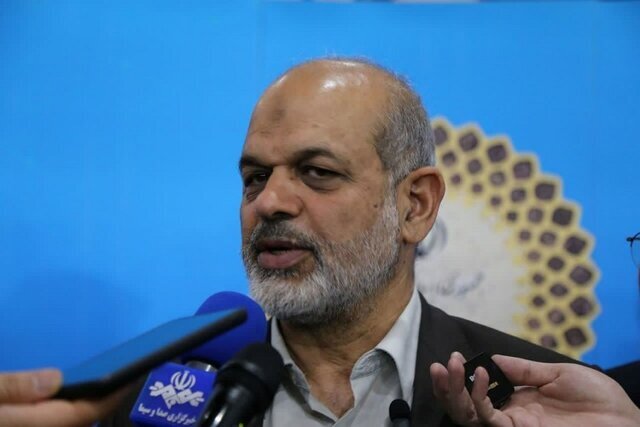Interior minister affirms readiness for 'fully electronic elections'

TEHRAN- Iranian Interior Minister Ahmad Vahidi has announced the Interior Ministry's full readiness to conduct parliamentary run-off elections “electronically.”
Vahidi emphasized that in eight constituencies where multiple representatives are to be elected, the elections will be entirely electronic.
"In the first round of elections, all-electronic voting took place in four constituencies. However, this marks the first time such elections are being conducted on this scale, signifying a great advancement in the realm of voting," Minister Vahidi stated.
He further outlined that polling stations and voting systems have been meticulously designated for this purpose, ensuring a smooth electoral process.
Vahidi highlighted the efficiency of electronic voting, noting that vote counting is instantaneous, with results available on the spot.
"In the first round of parliamentary elections, where voting was entirely electronic in four constituencies, results were compiled and determined by midnight," Vahidi explained.
In terms of public outreach and education on electronic voting procedures, Vahidi mentioned that training sessions will be conducted through IRIB (Islamic Republic of Iran Broadcasting), with plans to intensify efforts in the forthcoming days.
On April 26, Minister Vahidi declared the readiness to proceed with the second phase of parliamentary elections.
Vahidi disclosed that all necessary arrangements have been completed for the upcoming electoral process. He highlighted the extensive preparations undertaken across all 22 constituencies for the second round of the 12th parliamentary elections.
Notably, Vahidi emphasized that eight constituencies will conduct the election entirely through electronic means.
The scheduled date for this phase of the parliamentary election is set for May 10.
Earlier on March 1, the country held parliamentary Assembly of Experts elections. The polls opened across Iran at 8 a.m. local time (0430) on Friday for parliamentary and Assembly of Experts elections.
More than 61 million people were eligible to vote.
About 15,000 parliamentary candidates were vying for 290 seats for a four-year term.
Simultaneously, people voted for 88 members of the Assembly of Experts, a body in charge of overseeing the performance of the Leader of the Islamic Revolution. Candidates for the assembly are elected for an eight-year term.
Ayatollah Seyed Ali Khamenei, the Leader of the Islamic Revolution, cast his ballot at a polling station in Tehran in the first minutes of voting.
Ayatollah Khamenei called on the voters to turn in big numbers to please friends and disappoint enemies.
“We ask the Almighty God to make today a happy day for the Iranian nation and that the results of the efforts of our dear people and those involved in the various issues of the elections may reach the desired results and benefit the Iranian nation,” the Leader said after voting.
“Our dear nation should know that today the eyes of many people in the world, both individuals and politicians and those who hold prestigious national and political positions, are on Iran and you.”
“They want to see what you are doing in this election and what will be the result of your election. Both our friends and people who are interested in the Iranian nation, as well as ill-wishers from all sides, observe the issues of our country and our beloved nation. Pay attention to this; make friends happy and disappoint the ill-wishers.”
The Leader repeated his recommendation to the voters in the previous elections to head to the polls and vote as early as possible.
“The second recommendation is to vote for as many people as you need, not fewer, in any constituency. For example, in Tehran, vote for 30 people in the Islamic Consultative Assembly and for 16 people in the Assembly of Experts of the Leadership,” he added.
Later in March 5, Mohsen Eslami, the spokesperson for the election headquarters, provided details on the parliamentary and Assembly of Experts elections.
Eslami announced that as results showed, 45 seats in the 290-seat parliament would be decided in the run-off elections. He said candidates who have failed to win less than 20 percent of the votes would be competing again in the spring to determine who will win the vacant seats.
According to the election law, two candidates will compete for each remaining seat.
However, all 88 seats for the Assembly of Experts were filled in March 1 elections.
In terms of voter participation, 48% were women and 52% were men, with 85% using their national ID cards to vote. This year for the first time since the 1979 Islamic Revolution, Iran allowed voters to use various identification documents to vote. Before the latest round of elections, people were only allowed to cast votes by identification booklets (Shenasnameh).
Leave a Comment